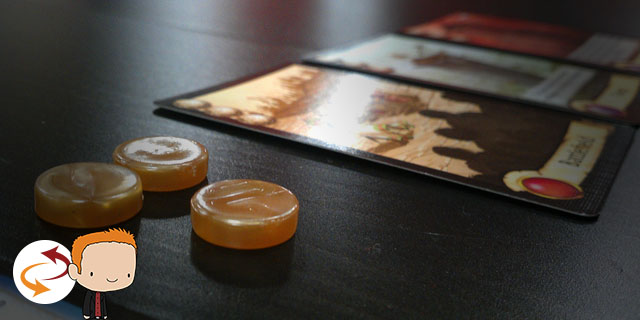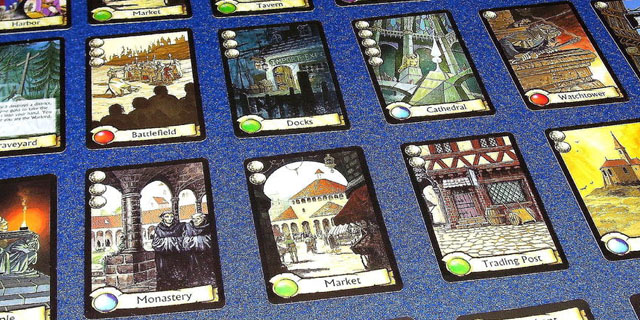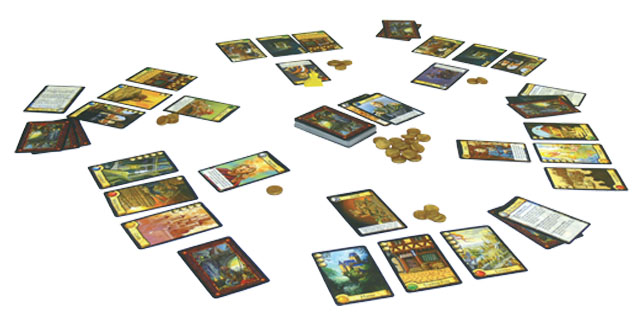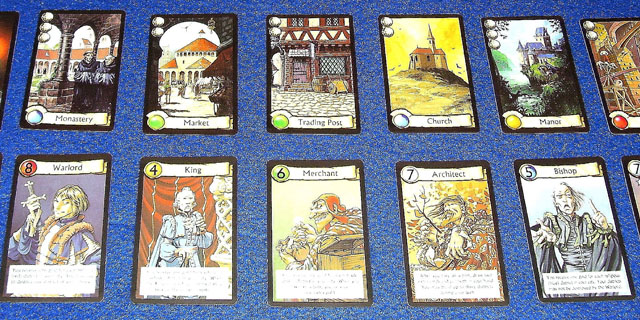
For the next two weeks, Snackbar Games’ columnists are all mixed up! Serotonin‘s Henry Skey steps in for this installment of Gaming Unplugged.
I’m not exactly a board game person. Oh sure, I pretended to like Monopoly like everybody else growing up, and we’d roll out some obscure card game at a friend’s house, usually involving multiple languages, ripped cards and missing instruction booklets. The obvious joke of playing a “bored” game came up frequently. I sound like the perfect guest host for a column dedicated to talk about non-electronic games, don’t I?
The truth is, I like board games and card games, but they’re an entirely different kettle of fish from video games.
Aside from the obvious differences, my own personal stance is that a majority of board games should be played infrequently, because the experience of learning the rules and the novelty of playing a game for the first few times is very difficult to emulate properly. It just can’t contend.
I think it probably has something to do with how you learn these types of games. In video games, you’ll generally read a manual or have an in-game tutorial show you the proper steps. With board games and card games, more likely than not, you’ll have one or two people, wise sages of the entertainment media no doubt, explain the rules and dictate the ultimate goals of the game. Those who are previously experienced may chime in with their own opinion and previously implemented strategies, if not to help then to assure you that you’re new and they are not.
The German-style card game Citadels is so fun, and so varied in its play styles and process, that I can definitely see myself purchasing the game and playing it over and over again. The rules may stay the same with each round, but the personalities involved, and pre-existing relationships, totally change the landscape of tactics.

It’s not a new game; Bruno Faidutti released the game, to much critical success, in the year 2000. For it to still be widely played 14 years later, in the hyper-competitive world of novelty card games, is truly impressive. It only takes moments to realize why millions have enjoyed it.
The game features eight main characters: Assassin, Thief, Magician, King, Bishop, Merchant, Architect and Warlord. Each character has an ability, associated with offensive, defensive or bonus-earning powers. I was immediately struck by how detailed and beautiful the artwork was on the designs of the cards. The semi-caricature portraits of each fantastical occupation silently urged me: pick me next round. You won’t regret it.
There are also district cards. These represent the various buildings and structures that you can add to your city. Each district card has a cost, represented by a number of gold coins on the card’s left side. In order to build it, you must pay the cost in gold. Easy enough! Additionally, each district card has a color associated with it: yellow, blue, green, red and purple. Yellow districts provide bonus income to the King, red provides income to the Warlord and so on. Again, the artwork is fantastic. It gets to the point where you’re almost disappointed to see a card leave your hand.
Each round begins with players taking turns choosing a character card and passing the rest to the next player. To my delight, not all characters are available every round, as the first step is to draw a random card from the character deck and set it face-down without looking at it. This ensures that no round will be the same, and forced myself not to rely on the same character.
This dynamic changes depending on how many players you have playing the game, another benefit of Citadels’ design. It’s quite versatile, as you can play with two to eight people. If you have a smaller group of two or three, you get two character cards each. Do you go all out offense? Mix and match? Or play the subtle hand, don’t make too much noise and just build?

Once all players have chosen a card, the player who has the “crown” calls out the characters in numerical order. If nobody picked the Assassin, you move onto the Thief and so on until somebody’s character is announced. You take two gold from the bank, or choose between one of two newly-picked district cards. Do you bank money, or stock up on cards? By spending the gold, you can build districts, adding to your total score. You can also use your character’s ability. These turns repeat until somebody has built eight districts. You receive points equal to the total combined costs of your districts, plus bonuses for having one district of each color and being the player to build eight districts. The winner is the person with the most points.
The game is thrilling, yet relaxing at the same time, and I’m sure that claim is entirely dependent on who you play with. Our session included my girlfriend, two of her hyper-competitive brothers and their respective significant others, for a total of six players. The differences in personalities were immediately evident, and they came through in our two games; the Thief, Assassin and Warlord were most often picked by the aggressors, while the Bishop, Merchant and Architect, with their more defensive abilities, were selected by the more passive players. I’m not sure if it was us not wanting to get involved in any harmless family conflict, or that we less-experienced players preferred the dominant players to duke it out and hopefully slip in past the finish line. Which is precisely what happened both times.
The Assassin was picked nearly every time, as his ability to completely wipe out another character’s turn was too valuable pass up, despite the risk of assassinating a missing character. You are also safe from the Thief’s clutches. Between butchery and pickpocketing, these two were always picked, and usually set the pace of each round. The Magician wasn’t played often, but was often game-changing when he was. You could either exchange your entire hand of cards with another player, or switch your hand with a new set of cards from the district pack. The King might be the most important card in the game, but it’s also the trickiest. When you play the King, you receive the Crown and you will be the first to choose your character in the draft of the next round. If there is no King next round, you keep playing first. I found this character to be a lightning rod late in the game, and I chose to ignore any unwanted attention. I really wanted to build my city, uninterrupted.

The Bishop is probably the card I was most comfortable with as a novice. His abilities are purely defensive: your districts are protected from the disruptive Warlord, and you receive extra gold for every blue district you have built in your city. I’m hardly pious in real life, but this was my go-to.
The Merchant, looking rather slimy in his portrait, allows you to receive an extra gold for every green district card. You also receive an additional gold after you take an action. The Architect was a card I envied and played poorly; every time I did use his ability to build up to three districts (instead of just one), I didn’t have the gold to support it. Timing was key, and I didn’t capitalize as I should have.
Then there’s the Warlord. The climax of each round, fueled by polite shouting and knowing nods of expectations. You receive one gold for each red district card, and you may destroy one district of your choice by paying gold. I felt like my Dragon’s Gate was always safe, due to its high cost, but I constantly picked the Bishop to be safe.
The games went rather quickly, both lasting just under an hour and a half. Keep in mind there was much stopping for food, drinks, brevity and amicable debate. I somehow won a game by keeping as meek as possible and, for once, shutting my big fat mouth about how I was quietly building away while everybody fought over the Assassin card. I have a feeling that my experience will factor into the next time we play. Kyla’s brother’s fiancée won the second game, keeping to roughly the same strategy: don’t say much, let the aggressors be aggressors and build away.
I highly recommend Citadels. Being a novice to the scene didn’t deter my enjoyment at all. In fact, I enjoyed being lectured and taught with relish, and my tutors were obviously keen to share their enjoyment of the game. I can definitely see each game’s strategy completely changing from round to round, and we didn’t even touch the expansion set, which includes eight new characters.



















